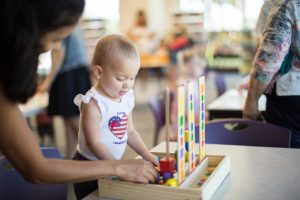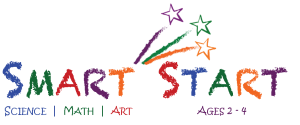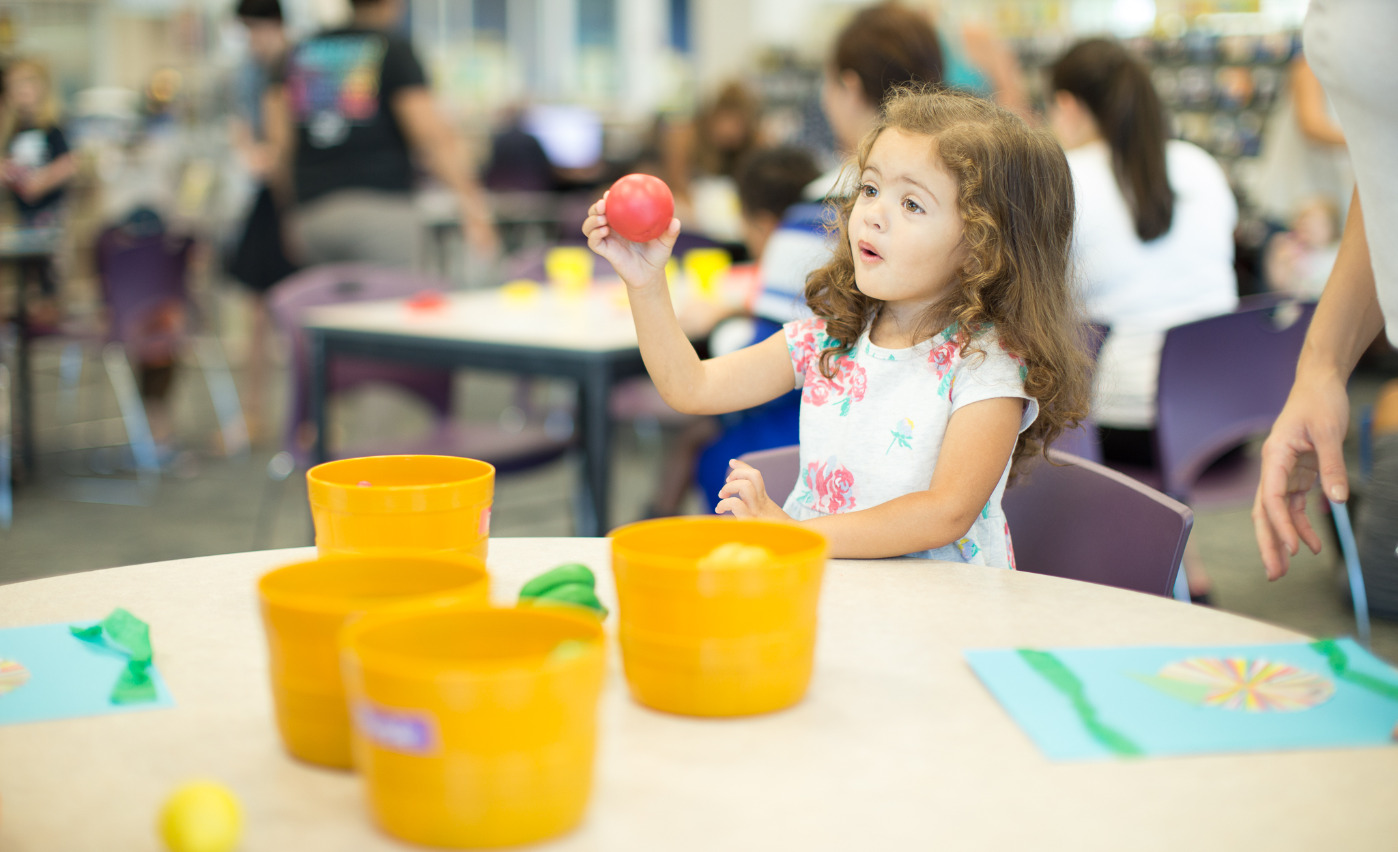| By Mira Tanna |
It’s Wednesday in the story room, and there is some calming music playing in the background while twenty toddlers are hard at work.
A girl is using a dropper to squeeze colored water onto a coffee filter. She is practicing her pincer grasp which will be useful when she starts to write. “Ava” is also building her skills of scientific reasoning, watching the yellow water turn the white filter a very light yellow, then watching another part of the filter turn reddish and – surprise! – seeing the area where the two colors bleed into each other turn orange. Ava’s mom hovers nearby, making sure Ava doesn’t dump colored water on the floor and helping her turn an already colored filter into a butterfly by putting a pipe cleaner in the middle.
Other kids are matching painted clothes pins to corresponding paint chips from the paint store. These children are learning to match and compare, honing their powers of observation as they differentiate between cerulean blue, azure and blueberry.
 The most popular table has sandboxes—five plastic bins filled with sand. Using common kitchen utensils like spatulas, strainers and ladles, kids dig up painted pasta, buttons and other surprises buried in the sand. Children are using problem solving skills: How can I separate the colored pasta from the surrounding sand? Which tools work best to accomplish this task? And wow – that shower of sand raining down from the slotted spoon is sure cool!
The most popular table has sandboxes—five plastic bins filled with sand. Using common kitchen utensils like spatulas, strainers and ladles, kids dig up painted pasta, buttons and other surprises buried in the sand. Children are using problem solving skills: How can I separate the colored pasta from the surrounding sand? Which tools work best to accomplish this task? And wow – that shower of sand raining down from the slotted spoon is sure cool!
Nearby, a boy and his father are arranging smooth black rocks into animal shapes. “Carlos” carefully stacks the rocks on top of each other. It’s difficult when they’re all funny shapes and sizes and don’t stack neatly like wooden blocks.
Debra Winslow, one of the library’s Youth Program Specialists, is moving from station to station, talking to the parents about the skills their children are developing, making sure that the parents give their children a wide enough berth to explore, and asking questions to help spur curiosity and imagination. She makes sure that the parents and caregivers don’t emphasize outcomes too much. It’s not important whether the rocks really look like an animal or the coffee filter turns into a perfect butterfly. “It’s the process that’s important, not the end result,” she explains.
The children are learning science, math, and art skills at this SMART Start program, which takes place on a monthly basis at the Orlando Public Library and three Orange County Library System (OCLS) branch locations. But it’s not only the toddlers who are learning. Their parents and caregivers are learning right along with them. All of the activities are designed to be replicated at home, and the explanations of the value of different activities, the interaction between parents  and their children, and the coaching provided to parents is every bit as important as the skills that these little ones are acquiring.
and their children, and the coaching provided to parents is every bit as important as the skills that these little ones are acquiring.
For the past couple of decades, librarians and educators have understood the importance of parent involvement in storytime to help their children develop pre-literacy skills. In the year 2000, the Public Library Association (PLA) and the National Institute of Child Health and Human Development partnered to conduct research on early literacy. Out of this effort came the Every Child Ready to Read initiative, which provided an evidenced-based approach to supporting early literacy practices by involving parents. The PLA and Association of Library Services to Children selected pilot libraries to implement the new approach and have supported training and research on its efficacy ever since (everychildreadytoread.org).
When it was first developed, Every Child Ready to Read represented a departure for many public libraries. “For many decades, parents were not encouraged to attend story hour, as a way for children to develop the independence needed to attend school. Parent engagement programs such as Every Child Ready to Read, however, take a different tack: Librarians can be more influential in a child’s life by teaching the parent how to engage with the child in ways that will foster early literacy” (Celano and Neuman 2015). Libraries have a unique role to play in children’s learning because, unlike child care centers or schools, the staff at libraries have as much time to interact with parents and caregivers as they do children, since the children most often are accompanied in the library by their parents and caregivers.
OCLS’ SMART Start programs, for toddlers and preschoolers ages 2-4, use the same evidence-based approach to create parent engagement in early STEAM programs. Developed by Debra Winslow, SMART Start is built around the philosophy that parents are the child’s first teachers. Library staff facilitate the learning process by creating stations that allow children and caregivers to test out different experiences.
Each SMART Start program contains one art activity, a related story, two enrichment activities and one free exploration. After reading or telling a story, the programmer explains the different stations and allows participants to explore. Each art station has a sample of a completed project on it. Staff become facilitators, placing the child and the parent at the center of the learning process. The activities help children learn spatial and shape awareness; basic strokes useful for writing; object manipulation helpful for writing and cutting; comparing, sorting, measuring and sequencing necessary for developing mathematical reasoning; and observation, prediction and experimentation to develop scientific understanding.
Survey results indicate that parents are learning at a higher rate than the national average for early childhood literacy programs in public libraries. OCLS compared survey responses for SMART Start to Project Outcome survey results of early literacy programs over a 15-month period at all public libraries reporting results in the US. One hundred percent of survey respondents attending SMART Start reported that they learned something they can share with their children (compared to 92% nationally in all early literacy programs). All parents reported that they will spend more time interacting with their children as a result of the program (compared to 92% nationally). And, again, 100% of SMART Start parents reported that they felt more confident to help their children learn (compared to 90% nationally).
As libraries increase their STEAM programming for kids of all ages, they would do well to involve parents who can reinforce skills at home and emphasize the use of household items over fancy technology as well as hands-on experiences over demonstrations.
 About the Author
About the Author
Mira Tanna is the Assistant Manager of Youth Services for Orange County Library System, Orlando, FL.
Sources
Celano, Donna C., and Susan B. Neuman. “Libraries emerging as leaders in parent engagement: parents are discovering that libraries offer opportunities to play with their children and learn how to improve their reading.” Phi Delta Kappan, vol. 96, no. 7, 2015, p. 30.
Every Child Ready to Read, www.everychildreadytoread.org, last accessed 4/24/17.
Project Outcome: Measuring the Impact of Public Libraries, Orange County Library District, March 2017.Alle Artikel

